- within Litigation and Mediation & Arbitration topic(s)
- with Senior Company Executives, HR and Finance and Tax Executives
- in United States
- with readers working within the Banking & Credit, Insurance and Law Firm industries
Class actions continue to shape the Canadian legal landscape. As we head toward the end of 2025, we note the following developments emerging from the class actions landscape across Canada so far this year1.
Class actions filed by jurisdiction
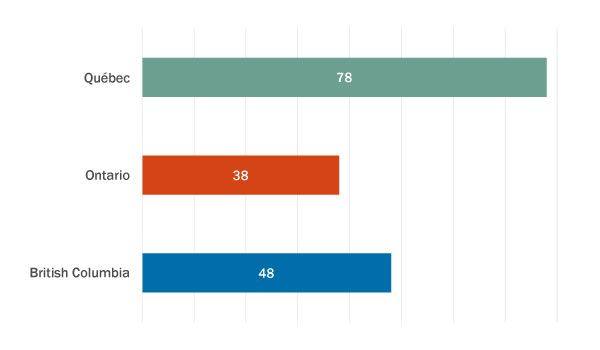
No fewer than 164 proposed class actions were filed in the leading jurisdictions. Québec led the way with 78 authorization applications—more than double Ontario's count and significantly ahead of British Columbia. The disparity underscores Québec's continued prominence as a jurisdiction of choice for initiating class proceedings, likely reflecting its procedural accessibility. Ontario and British Columbia followed with 38 and 48 applications respectively, suggesting a steady but comparatively moderate pace of filings.
Class actions filed by industry
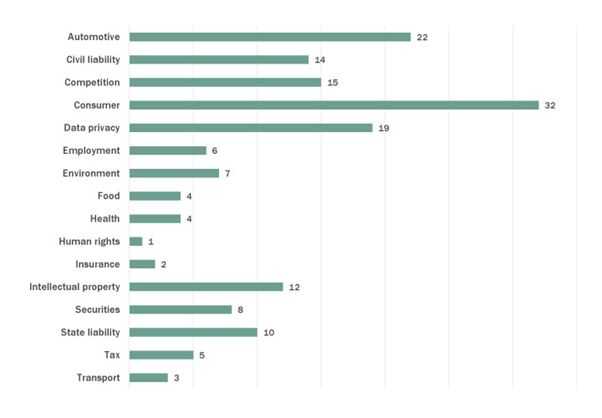
This year's data shows a strong concentration of class actions filings in the consumer sector, which leads with 30 filings, followed by product liability (22 in the automotive sector only) and data privacy (19). The civil liability and competition law sectors also show notable activity, with 14 and 15 filings respectively. We are also seeing a rise in AI-related class actions—which are emerging across multiple sectors including data privacy, copyright and consumer protection—highlighting growing legal attention to the deployment and impact of artificial intelligence.
Authorization/certification decisions by jurisdiction
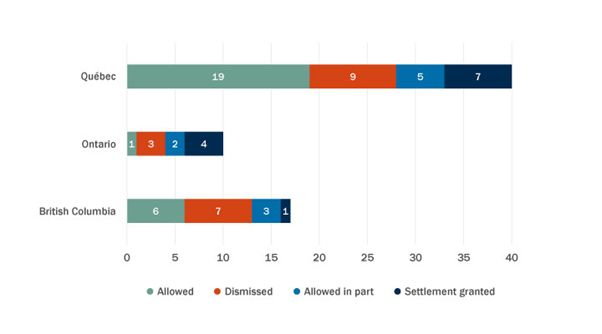 /p>
/p>
This graph provides a comparative snapshot of authorization/certification outcomes across the country, highlighting both the volume and nature of the decisions rendered. Québec stands out with the highest number of filings (40), and a relatively high rate of authorizations (19 fully authorized, 5 for settlement purposes, and 7 authorized in part), underscoring its continued role as a leading jurisdiction for class actions.
In British Columbia, the data reflects a balanced mix of outcomes: of the 17 filings, 6 were fully certified, 1 certified for settlement, and 3 certified in part, indicating a moderate but active certification landscape. Ontario, with 10 filings, saw 3 full certifications, 2 for settlement purposes, and 4 partial certifications, suggesting a more cautious approach to class action certification but still a meaningful level of judicial engagement.
Authorization/certification outcomes
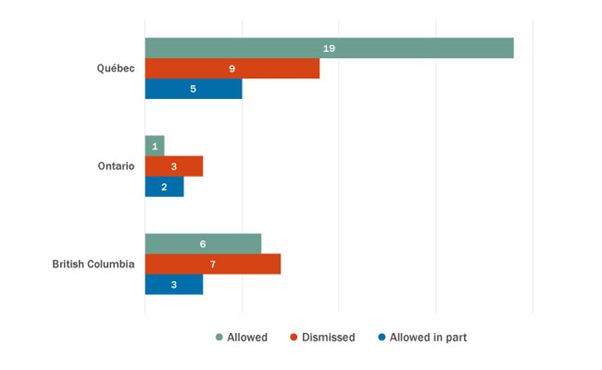
This graph illustrates the contrasting outcomes of authorization judgments across Québec, British Columbia and Ontario, shedding light on regional differences in judicial approaches to class actions. Québec leads with 19 authorizations granted versus 9 denied, reinforcing its reputation as a jurisdiction more receptive to class proceedings. In British Columbia, the balance is nearly even, with 6 granted and 7 denied, while Ontario shows the lowest volume, with only 1 authorization granted and 3 denied.
These outcomes are consistent with the number of filings in each jurisdiction: Québec sees significantly more filings, which naturally results in a higher number of decisions (both granted and denied). The data reflects not only procedural differences but also variations in judicial philosophy and case profiles across provinces, offering valuable insight for strategic planning in class action litigation.
Merit decisions (for Québec only)
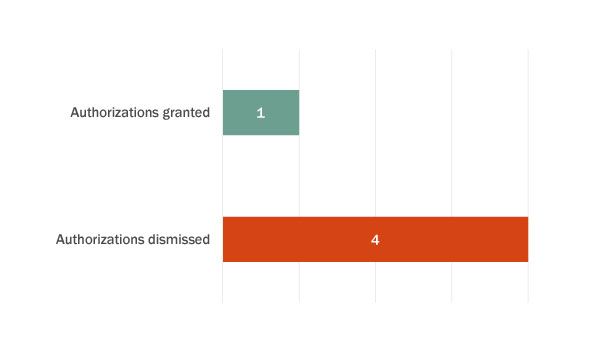
This graph highlights a critical trend in the evolution of class actions in Québec: while many actions are successfully authorized, they are increasingly dismissed on the merits. The data shows that out of the cases that proceeded to a merits judgment, only one was upheld, while four were dismissed. This reflects a broader pattern observed in recent years: authorization in Québec remains accessible due to its low threshold, but success at the merits stage is far from guaranteed.
Of note, two of the five decisions—including the one granted—are currently under appeal.
Footnote
1 This mid-year report presents national class action filings from January 1 to September 30, 2025 using publicly available databases. In Québec, the Class Action Registry, CanLII and the dockets were consulted, while in Ontario and British Columbia, the National Class Action Database, Ontario Justice Services, Online Court Portal, Ontario Class Action Database, CanLII, Lexis+ Canada and Westlaw Canada were consulted. The statistics presented for Ontario and British Columbia are subject to the inherent limitations in the National Class Action Database, which cannot guarantee comprehensive search results because the database depends on voluntary submissions from lawyers across Canada.
The content of this article is intended to provide a general guide to the subject matter. Specialist advice should be sought about your specific circumstances.






